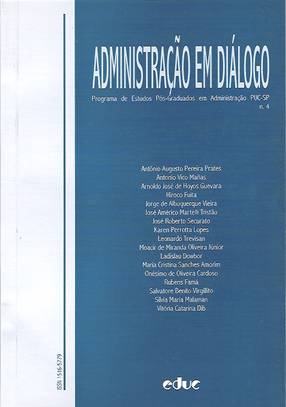Aprendizagem e conhecimento nas organizações – as contribuições das ciências da cognição
DOI:
https://doi.org/10.20946/rad.v4i1.880Abstract
Este artigo é uma reflexão sobre conceitos relativos a aprendizagem e conhecimento nas organizações. Na perspectiva das ciências da cognição, um conceito abre ou fecha possibilidades da ação, indica cursos de ação (Maturana: 1997), daí a importância, no universo das organizações, em ordenar e classificar conceitos na área indicada. Pela mesma razão, a utilização deste ou daquele conceito não é indiferente se o objetivo é intervir na realidade. Dito de outra forma, é de grande importância prática definir o conteúdo de expressões sobre aprendizagem, conhecer, conhecimento, entre outros. Palavras-Chave: aprendizagem, gestão do conhecimento, ciências da cognição. Abstract The following article is a reflection on concepts related to Learning and Knowledge whithin organizations. As far as ciencies of cognition are concerned, one concept may open or close possibilities of action, points to courses of action (Maturana, 1997), hence the importance, in the world of organization, to put in order and to classify concepts in their appropriate area. For the same reason, the usage of one or another concept is not indiferent, if the goal is to intervene in reality. In other words, it is of great importance to define the meaning of expression such as Learning, Knowing, Knowledge, among others. Key-Words: Learning, Knowledge management, ciencies of cognition.Metrics
Downloads
Published
How to Cite
Issue
Section
License
Authors who publish in this journal agree to the following terms:
1. Authors retain the copyright and grant the journal the right of first publication, with the work licensed simultaneously under a Creative Commons Attribution License after publication, allowing the sharing of work with acknowledgment of the authorship of the work and initial publication in this journal.
2. Authors are authorized to take additional contracts separately, for non-exclusive distribution of the version of the work published in this journal (eg publish in institutional repository or as a book chapter), with acknowledgment of authorship and initial publication in this journal.
3. Authors are allowed and encouraged to publish and distribute their work online (eg in institutional repositories or on their personal page) at any point before or during the editorial process, as this can generate productive changes, as well as increase the and the citation of the published work (See The Effect of Free Access).








